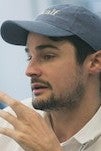 Bradley Campbell, a 2013 alumnus of Metcalf’s Annual Science Immersion Workshop for Journalists, goes to work everyday to his “dream job” as a producer for PRI’s weekday radio show, The World.
Bradley Campbell, a 2013 alumnus of Metcalf’s Annual Science Immersion Workshop for Journalists, goes to work everyday to his “dream job” as a producer for PRI’s weekday radio show, The World.
Raised in a rural logging town surrounded by 11 acres of woods, Campbell used to listen to public radio during school breaks while “cutting shrubs or battling back English Ivy” as a landscaper. Full of drive and determination, Campbell landed his first journalism job as a gift-guide writer for a small Oregon newspaper.
“I applied for an internship at a local paper and I got passed up for every internship that involved news, sports, local politics, and eventually they felt sorry for me,” he said unabashedly of his gift-writing gig.
Campbell went on to report for two Midwest newspapers before landing jobs at NPR stations on Cape Cod, where he covered baseball, and Boston’s WGBH, where he worked as an assistant producer for the national radio news show, The Takeaway, and wrote for Morning Edition. It was during his tenure at Rhode Island Public Radio (RIPR) as an environment reporter when he applied for a Metcalf Fellowship, which he described as “an amazing crash course in a week.”
“One of the best things about the Fellowship was that it allowed me to interact with scientists,” said Campbell. “Sometimes journalists treat them [scientists] like excel spread sheets, like they don’t have a soul, which is so far from the truth.”
“Scientists come from such diverse backgrounds and they’re not just boring folks in lab coats,” he added. “I think realizing that they’re really fascinating characters promotes better interaction with scientists and leads to better stories.”
As a producer for PRI’s the World, Campbell now covers everything from ISIS, the war in Ukraine, conflicts in Israel, and presidential elections in Argentina to environmental stories about fishermen in Amsterdam tasked with removing bicycle litter from canals.
For his environmental stories, Campbell still draws upon the lessons from his Metcalf training about translating and interpreting scientific data. “Taking really complex information and being able to distill it down to a wider audience without dumbing it down, that’s what’s key,” Campbell explained. “Being able to convey an idea without bogging down the listener.”
This skill, he said, gives him the ability to approach environmental topics with confidence, “It’s like not being afraid to swim in the deep end.”
Looking back on his career, Campbell said he’s most proud of his ability to create compelling stories that engage his audience, ensuring that listeners “are not going to snooze or change the station.”
Campbell is a graduate of the Salt Institute for Documentary Studies in Portland, Maine. He completed a fellowship at the Medill School of Journalism at Northwestern University.
Read stories by Bradley Campbell
Where People Are Pail Full-Time, With Benefits, to Fish for Bikes
The Scars of Internment Camp Never Completely Healed for American Furniture Maker Mira Nakashima
‘The Water Knife’ is Climate Science Wrapped in Pulpy Goodness

